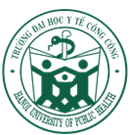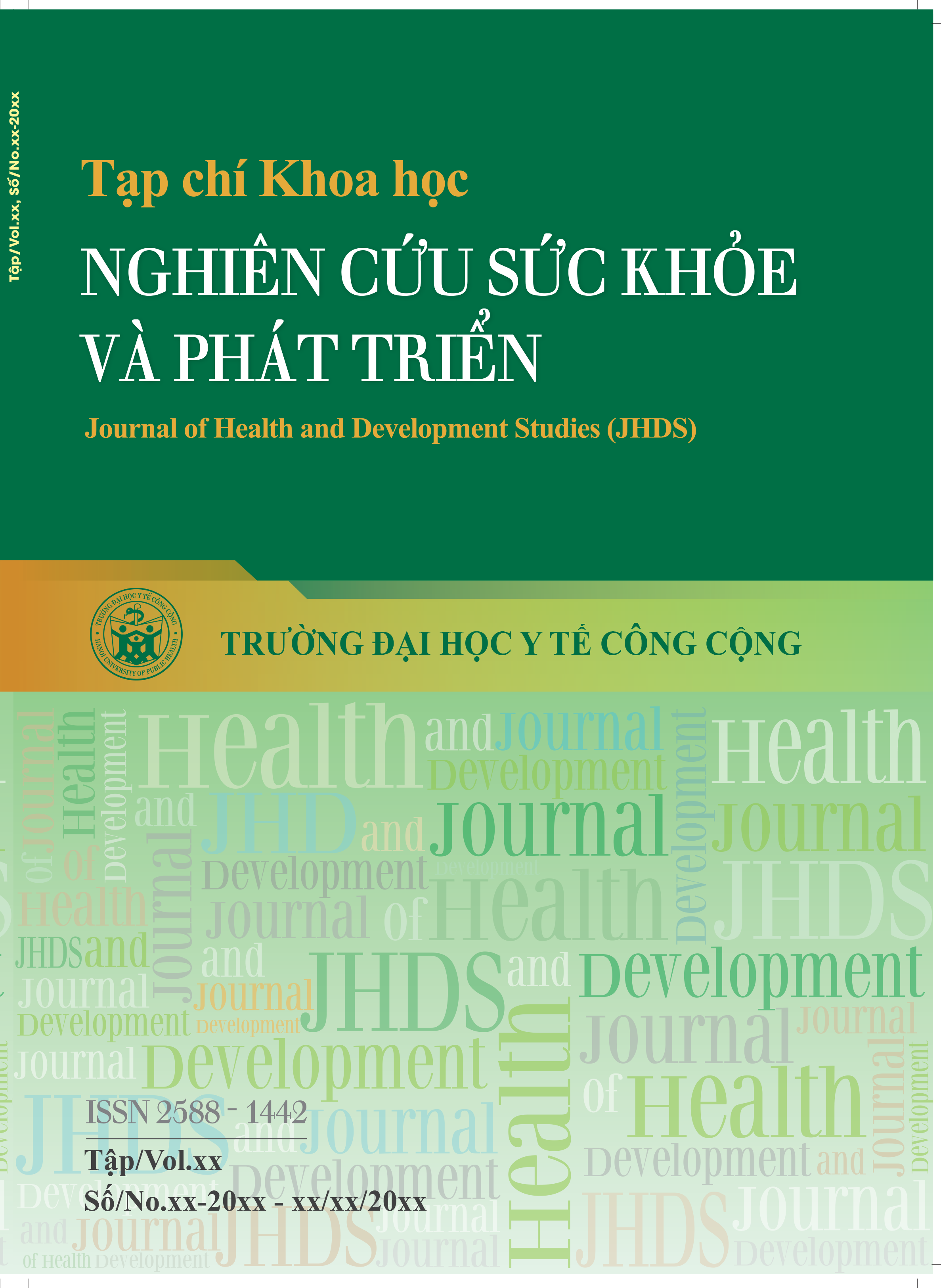Tạp chí
Khoa học Nghiên cứu Sức khỏe và Phát triển
(Journal of Health and Development Studies – JHDS)
Trường Đại học Y tế công cộng
For the author
- Trang chủ /
- For the author
Authors submitting manuscripts to the Journal of Health and Development Studies should carefully read the following guidelines:
1. Types of Articles
The Journal of Health and Development Studies is a peer-reviewed journal that publishes the following types of articles:
- Original papers
- Review papers
- How-to papers
- Design papers
- Commentary
- Thesis review/dissertation review
- Pharmaceutical and medical scientific information
2. Manuscript and Author Requirements
- The submitted manuscript must not have been previously published or under consideration by any other domestic or international journal/publication.
- Each author may be the first author of a maximum of three (03) articles in a single issue.
- Authors are responsible for the content of their manuscripts and must comply with Vietnamese regulations.
- A signed Author Commitment Form (according to the provided template) must be submitted along with the manuscript.
3. Manuscript File Format
- Manuscripts should be in Microsoft Word (.doc, .docx) format.
- Images should be in .tif or .jpg format.
- Use A4 paper size, 2.5 cm margins on all sides.
- Use Unicode encoding, Times New Roman font, size 12, with 1.5 line spacing.
4. Reference Formatting
- Authors should use EndNote (http://endnote.com/) for citation management.
- References should follow the Vancouver style, numbered in parentheses (1) or (1,2), (1,2,4-9), etc., in the order they appear in the text.
- Do not separate Vietnamese and English references.
- Examples:
- Journal articles:
- Nguyễn Văn Hòa, Nguyễn Hữu Kha. Suy dinh dưỡng tại Việt Nam và một số yếu tố liên quan, 2016. Tạp chí Nghiên cứu Sức khỏe và Phát triển 2017; 20(5): 14–19.
- Leurs R, Church MK, Taglialatela M. H1-antihistamines: inverse agonism, anti-inflammatory actions and cardiac effects. Clin Exp Allergy. 2002 Apr;32(4):489-498.
- Books:
- Lê Quang Công, Nguyễn Cảnh Toàn, Phan Văn Sáng. Cẩm nang vi sinh vật y học. NXB Nông nghiệp, Hà Nội, 2005: 99-127.
- Murray PR, Rosenthal KS, Kobayashi GS, Pfaller MA. Medical microbiology. 4th ed. St. Louis: Mosby; 2002.
- Book chapters:
- Meltzer PS, Kallioniemi A, Trent JM. Chromosome alterations in human solid tumors. In: Vogelstein B, Kinzler KW, editors. The genetic basis of human cancer. New York: McGraw-Hill; 2002. p. 93-113.
- Websites:
- American Medical Association [Internet]. Chicago: The Association; c1995-2016 [cited 2016 Dec 27]. Available from: https://www.ama-assn.org/about/office-international-medicine.
- Journal articles:
5. Article Formatting Guidelines
Authors can download the general article formatting guidelines.
5.1. Original Papers
- Maximum 4,000 words (~10 standard pages), including tables, figures (≤6), references, and abstracts in both Vietnamese and English.
- Format:
- Title (Vietnamese): Lowercase, bold.
- Authors & Affiliations: Full author names, email addresses, and affiliations. Do not include titles or degrees.
- Abstract: Structured format with Objective, Study Design, Study Location & Period, Study Subjects, Results, and Conclusion (max 250 words).
- Keywords: 3-6 concise terms directly related to the article.
- Introduction: Research rationale and objectives.
- Methods: Including Study Design, Study Location & Period, Study Subjects, Sample Size, Variables, Data Collection Methods, Data Analysis, and Ethical Considerations.
- Results: Presented according to research objectives.
- Discussion: Interpretation of results, comparison with relevant studies, study limitations, and recommendations.
- Conclusion: Summarizing key findings without repeating numerical results. No bullet points or numbering.
- Acknowledgments: Recognizing individuals, institutions, or funding sources supporting the study.
- Title, Authors, Abstract, Keywords in English.
- References: Follow Section 4 guidelines.
5.2. Review Papers
- Maximum 4,000 words (~10 standard pages), including images, tables, references, and abstracts in both Vietnamese and English.
- Format:
- Title (Vietnamese): Lowercase, bold.
- Authors & Affiliations: Full names, emails, affiliations. No titles or degrees.
- Abstract: Structured format with Objective, Literature Search & Review Methods, Results, and Conclusion (max 250 words).
- Keywords: 3-6 terms directly related to the article.
- Introduction: Rationale and objectives of the review.
- Review Methods: Search strategy, sources, keywords, inclusion/exclusion criteria, and review methods.
- Results: Summary of selected studies and key findings.
- Discussion: Interpretation of findings, gaps in the literature, and future research directions.
- Conclusion: Summary of main review findings without numerical repetition. No bullet points or numbering.
- Acknowledgments: Recognizing contributions from individuals, institutions, or projects.
- Title, Authors, Abstract, Keywords in English.
- References: Follow Section 4 guidelines.
5.3. Other Article Types
- Maximum 4,200 words (~10 standard pages), including figures, tables, references, and an abstract in English.
- Format:
- Title (Vietnamese): Lowercase, bold.
- Authors & Affiliations: Full names, emails, no titles or degrees.
- Abstract: Structured with Objective, Results, and Conclusion (max 250 words).
- Keywords: 3-6 concise terms directly related to the article.
- Introduction: Rationale and objectives.
- Main Content: Adapted to article type.
- Conclusion: Summary of key findings.
- Acknowledgments: Recognizing contributors and funders.
- Title, Authors, Abstract, Keywords in English.
- References: Follow Section 4 guidelines.
6. Enhancing Manuscript Quality
To improve manuscript quality, authors should refer to the "Guidelines on Research Reporting Standards" by the Hanoi University of Public Health. These guidelines are based on internationally recognized research methodologies and reporting standards used by peer-reviewed journals worldwide. Additional reporting guidelines are available at http://www.equator-network.org/.
Plagiarism detection tool: Turnitin.
7. Manuscript Submission
Authors must submit their manuscript and the signed Author Commitment Form (see Section 2) via email to: jhds@huph.edu.vn.
8. Review Process
Step 1: Receipt of Manuscript (BM.01.TC.QT01, BM.02.TC.QT01)
The Journal of Health Research and Development (JHDS) receives submissions from authors both within and outside the institution via the website or email address: jhds@huph.edu.vn (when submitting via email, authors must cc all members of the article's author team). Submissions must comply with the journal's regulations and article templates (BM.01.TC.QT01, BM.02.TC.QT01). Upon receipt, the Journal Secretary acknowledges receipt to the authors. The journal does not accept manuscripts that violate copyright (previously published or disclosed in another journal/publication; lack of consensus among authors regarding the content of the article; inaccurate data; ethical violations in research; conflicts of interest with agencies, organizations, individuals, sponsors; unwillingness to transfer ownership rights to the journal), or manuscripts of poor quality, incorrect structure, format, or out-of-scope content. The Secretary receives the draft, checks it, provides feedback, and addresses administrative matters related to the article within 5 working days. The author team will revise (if necessary) and resubmit the draft after editing comments within 3 working days.
Step 2: Review (BM.03.TC.QT01/ BM.04.TC.QT01)
a. The Secretary seeks the Editor-in-Chief's opinion on assigning members of the Editorial Board to review each article within 3 working days. The Secretary sends the article draft to the assigned reviewers (BM.03.TC.QT01/ BM.04.TC.QT01). Each article draft is sent to 2 independent reviewers (after anonymizing author information) within 3 working days. Within 5 working days, reviewers are required to respond whether they accept the review assignment. If no response is received, the Secretary contacts the reviewer to confirm their willingness to review the article. If the reviewer declines, the Secretary seeks alternative reviewers.
b. The content of the article draft is kept confidential; reviewers may not discuss it with anyone without prior permission from the Editor-in-Chief. Reviewers anonymously send feedback within 10 working days of receiving the draft. If no response is received within 10 working days, the Secretary contacts the reviewer for feedback.
c. Reviewers will evaluate the following issues:
-
Importance of the research/policy question;
-
Uniqueness of the research/policy content;
-
Strengths and weaknesses of the research design, data collection and analysis, or policy analysis;
-
Writing style, organization, and presentation of data in the article;
-
Impact of findings drawn and demonstrated.
Step 3: Handling Review Results
a. Article accepted by 2 reviewers:
-
The Secretary notifies the author of the reviewers' opinions (after removing reviewer information) within 3 working days.
-
The author revises the draft according to the reviewer's opinions and justifies the revisions within 10 working days.
-
The Secretary rechecks the author's revisions against the reviewer's opinions for appropriate edits. If revisions are not suitable, the Secretary sends the article back to the author for further editing.
-
After the author has made appropriate revisions as per the reviewer's opinions, the Secretary runs the Turnitin software for the article draft within 2 working days. The Secretary informs the author of the review results for further revisions if the similarity rate exceeds the regulations (total article not exceeding 30% similarity and no single source exceeding 10%), agreeing to publish, and fee submission within 3 working days.
b. Article accepted by 2 reviewers with revisions:
-
The Secretary notifies the author of the reviewers' opinions (after removing reviewer information) within 3 working days.
-
The author revises the draft according to the reviewer's opinions and justifies the revisions within 10 working days.
-
The Secretary receives the author's revised draft, sends the revised article draft, explanatory transcript, and review comments to assigned reviewers in rounds 2 and 3 (after anonymizing author information) within 3 working days.
-
Reviewers will send feedback rounds 2 and 3 within 5 working days after receiving the draft.
-
The Secretary notifies the author of the opinions of reviewers in rounds 2 and 3 within 3 working days.
-
The author revises the draft according to the reviewer's opinions and justifies the revisions in rounds 2 and 3 within 5 working days.
-
If the author does not agree with the reviewer's opinions, they will respond in writing to the Editorial Board through the Secretary, and then the Secretary will decide with the Editor-in-Chief.
-
The Secretary rechecks the author's revisions against the reviewer's opinions for appropriate edits. If revisions are not suitable, the Secretary sends the article back to the author for further editing.
-
After the author has made appropriate revisions as per the reviewer's opinions, the Secretary runs the Turnitin software for the article draft within 2 working days. The Secretary informs the author of the review results for further revisions if the similarity rate exceeds the regulations (total article not exceeding 30% similarity and no single source exceeding 10%), agreeing to publish, and fee submission within 3 working days.
c. Article accepted by 1 reviewer, rejected by 1 reviewer:
-
The Secretary notifies the author of the opinions of 2 reviewers and sends the article to the third reviewer; the third reviewer will also consider and send opinions for the article as the first 2 reviewers according to the rounds. If the article is approved by the third reviewer, proceed as the article is approved by 2 reviewers/ agreed with the revision.
-
If the third reviewer does not agree to publish, the Secretary notifies the author of the review result for refusal to publish.
d. Article rejected by 2 reviewers:
-
The Secretary notifies the author of the review result for refusal to publish.
9. Submission Fee
-
Articles that are confirmed for publication in the journal are required to pay a publication fee of 1,000,000 VND per article. Detailed payment instructions will be provided by the Journal Secretary via email at: jhds@huph.edu.vn, or authors may contact the following phone numbers: 024 6266 3024 / 0987 811 283.

